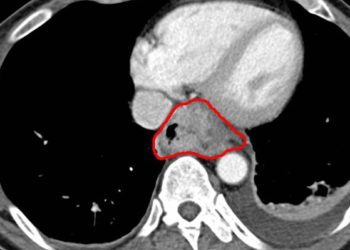Capecitabine maintenance therapy for metastatic nasopharyngeal carcinoma improves progression-free survival
1. Progression-free survival is longer in those treated with capecitabine maintenance therapy as compared with best supportive care
2. Adverse effects experienced by patients in the treatment group were as expected including myelosuppression, hand-foot syndrome and mucositis.
Evidence Rating Level: 1 (Excellent)
Study Rundown: Survival outcomes are improved with the use of capecitabine maintenance therapy, but there has been limited research in the context of metastatic nasopharyngeal carcinoma (NPC). This study aimed to compare capecitabine maintenance therapy versus best supportive care (BSC) on outcomes of progression-free survival (PFS), overall survival (OS), and safety. Disease progression occurred in 23 of 52 patients in the treatment group, compared with 37 of 52 patients in the BSC group. Median PFS in the treatment group was greater than in the BSC group (35.9 months compared to 8.2 months in the BSC group. In the capecitabine group, median OS was not reached, whereas it was 41.5 months in the BSC group. Analysis revealed no significant difference between the groups, however, once patients who received crossover treatment were accounted for, there was a significant OS difference noted in favour of the treatment group. Fifty patients in the capecitabine group experienced adverse effects (AEs) as compared to 48 in the BSC group. The most common mild AEs included anemia, neutropenia, nausea/vomiting, mucositis and hand-foot syndrome. Severe AEs were infrequent, but were noted in the treatment group, including anemia (12%), hand-foot syndrome (10%), nausea/vomiting (6%), among others. Limitations to this study include that the OS results were immature, the sample size was small, it was an open-label design and was a single-centre study. Additionally, patients who were older than 65 years old were excluded from this trial, so the results of this study may not be applicable to an older patient population. Overall, capecitabine can offer improved survival benefits by increased progression-free survival, as well as potentially improved overall survival.
Click to read the study in JAMA Oncology
In-Depth [randomized controlled trial]: This single-centre, open-label, randomized phase 3 clinical trial enrolled and randomly assigned 104 adult patients between the ages of 18 and 65 in a 1:1 fashion to receive either capecitabine maintenance therapy or BSC (52 for each group). Patients were induced with 4-6 cycles of paclitaxel, cisplatin, and ca The primary study outcome was progression-free survival (PFS). Secondary outcomes included overall survival (OS) and safety. Median PFS was 35.9 months (95% confidence interval (CI), 20.5 months – not reached) in the treatment group versus 8.2 months (95% CI, 6.4-10.0 months) in the BSC group. The hazard ratio (HR) was 0.44 (95% CI, 0.26-0.74). Median OS was not reached in the therapy group and was 41.5 months in the BSC group. There were no differences in OS between the two groups [HR, 0.59 (95% CI, 0.30-1.16)]. However, once crossover patients were accounted for, there was a significant OS difference detected in favour of capecitabine [HR, 0.50 (95% CI, 0.26-0.99)]. Adverse events were noted in 50 of 52 patients in the capecitabine group, as compared to 48 of 52 in the BSC group. Anemia, neutropenia, nausea/vomiting, mucositis and hand-foot syndrome were the most common mild AEs. Less common were severe AEs, which included anemia (12%), hand-foot syndrome (10%), nausea/vomiting (6%), among others, within the capecitabine group. Only one person from the treatment group withdrew for serious AEs (nausea/vomiting, fatigue) and no deaths related to the treatment were reported.
Image: PD
©2022 2 Minute Medicine, Inc. All rights reserved. No works may be reproduced without expressed written consent from 2 Minute Medicine, Inc. Inquire about licensing here. No article should be construed as medical advice and is not intended as such by the authors or by 2 Minute Medicine, Inc.









